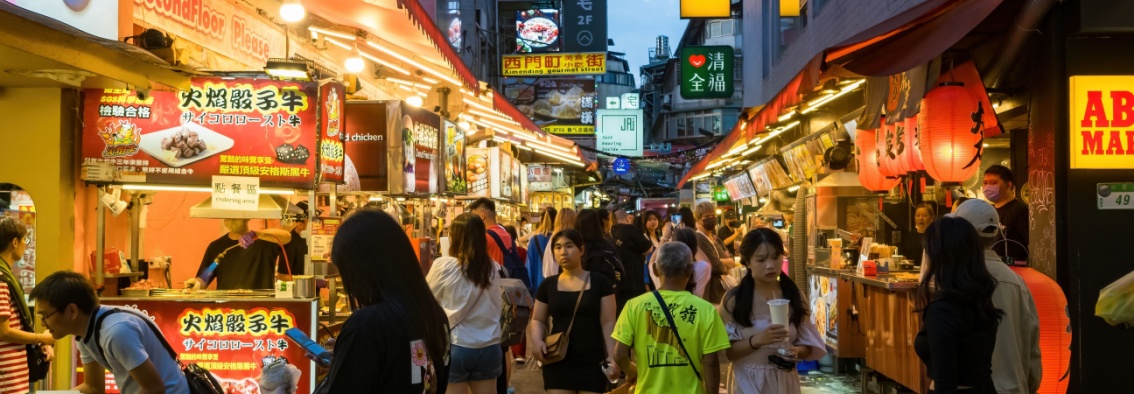The recent news that Taiwan has been ranked as the happiest place in Asia and 27th globally in the 2025 World Happiness Report marks a significant achievement for a place that navigates complex geopolitical tensions and ongoing social transformation. Moving ahead of Singapore and securing the top position in Asia is certainly cause for celebration, but the true significance of this recognition goes far beyond mere numbers.
This achievement invites exploration of a deeper question: What underlying factors have contributed to Taiwan’s happiness standing, and what can we learn from both Taiwan’s cultural heritage and global research on the determinants of happiness?
Happiness Through Shared Meals and Social Connections
The World Happiness Report highlights an intriguing finding: Taiwanese people report an exceptional habit of sharing meals, enjoying 10.1 shared meals out of a possible 14 weekly opportunities. This places Taiwan 8th globally in meal-sharing frequency—a seemingly simple metric that carries profound implications.
As noted by the director of Oxford University Wellbeing Research Center and editor of the 2025 World Happiness Report, “sharing meals and trusting others are even stronger predictors of wellbeing than expected.” In an era characterized by growing social isolation and increasing political polarization, Taiwan’s communal eating culture may be one of its greatest, yet least recognized, social assets.
This phenomenon is visible throughout daily Taiwanese life: families gathering for evening meals, colleagues leaving their desks to eat lunch together, and the vibrant night market culture where communities congregate amidst food stalls. What might appear as casual dining actually constitutes the invisible social infrastructure that enhances collective resilience and well-being.
The contrast between Taiwan and its neighboring regions is revealing. The report notes that dining alone is increasingly common in Japan and South Korea, often attributed to rising single-person households and demographic aging—challenges that Taiwan also faces. Yet, the Taiwanese commitment to communal eating persists despite similar demographic pressures, suggesting deeper cultural factors at work.
Insights from Cross-Cultural Research
To fully appreciate Taiwan’s happiness achievement, it’s helpful to consider broader research on what constitutes happiness across cultures. A comprehensive review by researchers compared studies from over 100 countries and 44 cultures, identifying three fundamental categories of happiness determinants: “Health,” “Hope,” and “Harmony.”
This “Integrated Model of the Determinants of Happiness” provides a useful framework for understanding Taiwan’s specific strengths. Under this model, happiness encompasses mental, emotional, and physical well-being (Health); purposeful work-life balance and personal growth (Hope); and harmony with one’s culture, traditions, community, and environment (Harmony).
Taiwan’s success can be understood through this lens. The universal healthcare system addresses the “Health” component, while economic resilience and entrepreneurial culture support the “Hope” dimension. Most distinctively, Taiwan excels in the “Harmony” category through strong family bonds, community connections, and the preservation of cultural traditions alongside modernization.
A Historical Perspective
Scholars from leading Taiwanese universities have extensively researched happiness from a Chinese cultural perspective. Research exploring how traditional Chinese philosophical frameworks influence conceptions of happiness has yielded fascinating insights.
Contrary to Western happiness models that often emphasize individual achievement and personal freedom, Chinese conceptions of happiness have historically centered on social harmony, family obligations, and balancing material and spiritual needs. Research has found that Taiwan’s happiness advantage may stem partly from its cultural ability to maintain traditional collectivist values while successfully adapting to modern economic demands—a delicate balance that many societies struggle to achieve.
Tradition and Innovation
Taiwan occupies a unique position globally: the island has preserved many traditional Chinese values while embracing democratic governance and economic innovation. This blend of heritage and progress creates a distinctive social environment that fosters well-being in multiple dimensions.
Unlike societies that have explicitly rejected tradition in pursuit of modernity, or those that rigidly adhere to tradition at modernity’s expense, Taiwan has developed a more organic synthesis. Its embrace of gender equality is emblematic of this approach—Taiwan elected East Asia’s first female president and legalized same-sex marriage before any other Asian society, yet these progressive achievements have occurred alongside the maintenance of strong family bonds and intergenerational connections.
Taiwan’s healthcare system similarly blends approaches. The world-class national health insurance system operates alongside traditional Chinese medical practices, with many Taiwanese moving comfortably between both systems based on specific needs.
This integrative approach extends to religious and spiritual life as well. A typical Taiwanese person might participate in Buddhist meditation for mental clarity, honor ancestors with Confucian-influenced rituals, visit a Taoist temple for specific life challenges, and perhaps even attend a Christian service with friends. This philosophical flexibility reflects a practical approach to well-being that transcends doctrinal boundaries.
Environmental Factors
The relationship between environmental quality and happiness is increasingly recognized in global research. Studies have highlighted that neighborhoods with higher levels of aesthetic quality, more water, green space, and cleaner air were consistently associated with greater happiness across cultures.
Taiwan faces significant environmental challenges due to high population density and industrial development. However, recent policy shifts toward sustainability, including expanded public transportation, urban greening initiatives, and renewable energy development, align with research showing that environmental improvements can significantly enhance collective well-being.
The network of national parks, extensive hiking trails, and urban green spaces like Taipei’s Da’an Forest Park (大安森林公園) provide crucial natural environments that research shows are vital for psychological restoration. The widespread use of scooters and bicycles, alongside efficient public transportation, reflects a transportation model that balances convenience with environmental impact.
 Image: Tourists and residents gather in Taipei’s Da’an Forest Park. (Image source: Taipei City Government Tourism and Information Bureau.)
Image: Tourists and residents gather in Taipei’s Da’an Forest Park. (Image source: Taipei City Government Tourism and Information Bureau.)
Beyond GDP to Well-being
While Taiwan’s economic strength certainly contributes to its happiness ranking, research suggests a more nuanced relationship between economic factors and well-being. Once basic needs are met, additional wealth yields diminishing returns in happiness, while factors like income inequality and economic insecurity can significantly undermine collective well-being regardless of overall prosperity.
Taiwan’s relatively equitable income distribution, low unemployment rates, and strong social safety nets likely contribute more to its happiness than absolute GDP figures. The entrepreneurial culture provides economic opportunities while the healthcare system protects against the catastrophic financial impacts of illness that undermine happiness in many developed economies.
However, challenges remain. Housing affordability in urban centers, work-life balance issues, and economic pressures on young families all emerged as potential threats to happiness in various studies. Addressing these issues will be crucial to maintaining and improving Taiwan’s happiness standing in coming years.
Lessons from Vietnam
The World Happiness Report also highlights Vietnam‘s remarkable upward movement in happiness rankings, rising from 83rd place in 2020 to 46th in 2025. This dramatic improvement offers potential lessons for Taiwan as it seeks to further enhance its own well-being.
Vietnam’s rapid happiness gains coincide with its significant economic growth, but the jump cannot be explained by economic factors alone. Cultural resilience, strong family structures, and community cohesion appear to play important roles in maintaining well-being despite rapid social change—factors that Taiwan should continue to nurture amid its own ongoing development.
A Path Forward
Taiwan’s recognition as Asia’s happiest place offers a moment to celebrate achievements while reflecting on how to preserve and strengthen the social, cultural, and environmental foundations of collective well-being. Drawing from both local experience and global happiness research, several key priorities emerge for Taiwan’s continued happiness journey.
Preserving social connections is paramount, as Taiwan’s unique meal-sharing culture and communal traditions serve as vital social infrastructure rather than mere cultural habits, deserving both protection and promotion in policy and social practice. Balancing tradition and modernity remains equally important, with Taiwan needing to continue finding harmonious ways to embrace progressive values while maintaining cultural continuity and strong family connections, which are essential for sustained well-being across generations. Environmental quality plays a critical role in this happiness equation, with studies showing that accelerating efforts to improve air quality, expand green spaces, and enhance sustainability directly contribute to happiness and quality of life for Taiwan’s residents. Addressing workplace culture presents another vital opportunity, as reducing excessive stress and improving work-life balance could significantly enhance regional happiness and productivity simultaneously.
Finally, ensuring intergenerational equity by enabling young Taiwanese to access affordable housing, meaningful employment, and opportunities to start families will help maintain happiness across age groups, safeguarding the well-being of future communities and ensuring Taiwan’s happiness achievement extends to coming generations.
Happiness as a Policy Goal
Perhaps the most important implication of Taiwan’s happiness achievement is not how it compares to other places, but how happiness metrics might guide policy decisions. Rather than focusing exclusively on economic indicators, Taiwan has an opportunity to pioneer governance approaches that explicitly target the determinants of happiness identified in research.
Singapore has already moved in this direction by establishing a Centre for Public Impact focused on well-being outcomes. Similarly, New Zealand has implemented a “Well-Being Budget” that evaluates policy proposals based on their impact across multiple dimensions of citizen welfare. Taiwan could build on these examples while incorporating its unique cultural perspectives on happiness.
Conclusion
Taiwan’s position as Asia’s happiest place reflects the cumulative effect of its cultural heritage, social policies, economic development, and community connections. This achievement reminds us that the most meaningful measure of a society’s success is not its economic output or international status, but the well-being of its people.
As Taiwan continues to navigate its unique challenges and change, preserving and enhancing the foundations of happiness—its social connections, cultural traditions, environmental quality, and economic security—should remain central priorities. In doing so, Taiwan can not only maintain its happiness standing but serve as a model for how societies can balance tradition and modernity, individual freedom and collective harmony, in the pursuit of genuine well-being.
Therefore, rather than viewing happiness as a competition, we should see Taiwan’s achievement as an invitation to deeper understanding of what makes life meaningful and fulfilling in the unique Taiwanese context—an understanding that might ultimately contribute to greater well-being both in Taiwan and beyond.
The main point: Taiwan’s ranking as Asia’s happiest place in the 2025 World Happiness Report reflects deeper cultural strengths beyond economic success. The island’s exceptional practice of communal dining—with Taiwanese sharing 10.1 meals weekly—represents a crucial social infrastructure that builds resilience. Taiwan’s unique blend of traditional values with progressive policies creates a harmonious foundation for wellbeing—Taiwan’s healthcare system, environmental initiatives, and cultural flexibility all contribute to this achievement. Rather than viewing happiness as a competition, Taiwan’s experience offers insights into balancing tradition and modernity, demonstrating that genuine wellbeing emerges from strong community bonds alongside individual opportunity.





